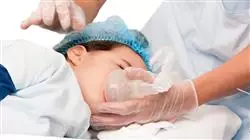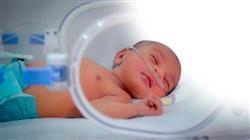Titulación universitaria
La mayor facultad de medicina del mundo”
Presentación del programa
Este programa te proporcionará una actualización integral en el área de la Pediatría Clínica, profundizando en los últimos avances en las urgencias pediátricas y en la pediatría hospitalaria y en atención primaria”

De todas las áreas sanitarias existentes, la pediatría es una de las que ha experimentado mayores cambios en los últimos años. Los recientes avances científicos en el manejo de numerosas patologías y la actualización de protocolos de actuación en campos como las urgencias han hecho que la pediatría haya incorporado nuevas técnicas de diagnóstico y tratamientos. Así, el especialista necesita ponerse al día de estos novedosos procedimientos para disponer de los métodos y procedimientos más actualizados.
Por esa razón se ha diseñado este programa, con el que podrá ponerse al día de forma inmediata en numerosos ámbitos sanitarios. De este modo, a lo largo de este Grand Máster, el pediatra podrá ahondar en cuestiones como la atención al niño grave fuera de la unidad de cuidados intensivos pediátricos, el derrame pleural paraneumónico o la esofagitis eosinofílica y su relación con la celiaquía.
Además, tendrá a su disposición todas las evidencias científicas en el abordaje de las crisis febriles y parainfecciosas, así como de la patología respiratoria del recién nacido y del síndrome de incompleta reabsorción del líquido pulmonar. No obstante, esta titulación no se detiene ahí y ofrece las últimas innovaciones en cuestiones como la bioseguridad actual en los laboratorios de microbiología para el manejo de muestras de diferentes virus.
De esta forma, el especialista accederá a los conocimientos más punteros disfrutando, asimismo, de una metodología de aprendizaje 100% online que le permitirá trabajar mientras estudia, sin interrupciones ni rígidos horarios. Además, contará con el cuadro docente más experto, compuesto por médicos con una dilatada experiencia, que se servirá de numerosos recursos multimedia para agilizar el proceso de enseñanza.
Además, unos destacados Directores Invitados Internacionales ofrecerán unas disruptivas Masterclasses que otorgarán a los egresados habilidades clínicas avanzadas.
Unos reconocidos Directores Invitados Internacionales impartirán unas exclusivas Masterclasses que te brindarán las técnicas más sofisticadas para manejar una amplia gama de Trastornos Pediátricos”
Este Grand Máster en Pediatría Clínica contiene el programa educativo más completo y actualizado del mercado. Sus características más destacadas son:
- El desarrollo de casos prácticos presentados por expertos en pediatría
- Los contenidos gráficos, esquemáticos y eminentemente prácticos con los que están concebidos recogen una información científica y práctica sobre aquellas disciplinas indispensables para el ejercicio profesional
- Los ejercicios prácticos donde realizar el proceso de autoevaluación para mejorar el aprendizaje
- Su especial hincapié en metodologías innovadoras en medicina y pediatría
- Las lecciones teóricas, preguntas al experto, foros de discusión de temas controvertidos y trabajos de reflexión individual
- La disponibilidad de acceso a los contenidos desde cualquier dispositivo fijo o portátil con conexión a internet
En esta titulación tendrás a tu disposición los mejores recursos didácticos: procedimientos en vídeo, resúmenes interactivos, clases magistrales... Todo para facilitar tu proceso de aprendizaje”
Incluye en su cuadro docente a profesionales pertenecientes al ámbito de la pediatría, que vierten en este programa la experiencia de su trabajo, además de reconocidos especialistas de sociedades de referencia y universidades de prestigio.
Su contenido multimedia, elaborado con la última tecnología educativa, permitirá al profesional un aprendizaje situado y contextual, es decir, un entorno simulado que proporcionará un estudio inmersivo programado para entrenarse ante situaciones reales.
El diseño de este programa se centra en el Aprendizaje Basado en Problemas, mediante el cual el alumno deberá tratar de resolver las distintas situaciones de práctica profesional que se le planteen a lo largo del curso académico. Para ello, el profesional contará con la ayuda de un novedoso sistema de vídeo interactivo realizado por reconocidos expertos.
TECH te permitirá profundizar, a través de este Grand Máster, en cuestiones como la enfermedad de Crohn o la reducción de parafimosis, siempre en pacientes pediátricos"

Un cuadro docente compuesto por profesionales en activo te acompañará a lo largo de todo el programa, garantizando que obtienes la actualización que buscas"
¿Por qué estudiar en TECH?
TECH es la mayor Universidad digital del mundo. Con un impresionante catálogo de más de 14.000 programas universitarios, disponibles en 11 idiomas, se posiciona como líder en empleabilidad, con una tasa de inserción laboral del 99%. Además, cuenta con un enorme claustro de más de 6.000 profesores de máximo prestigio internacional.

Estudia en la mayor universidad digital del mundo y asegura tu éxito profesional. El futuro empieza en TECH”
La mejor universidad online del mundo según FORBES
La prestigiosa revista Forbes, especializada en negocios y finanzas, ha destacado a TECH como «la mejor universidad online del mundo». Así lo han hecho constar recientemente en un artículo de su edición digital en el que se hacen eco del caso de éxito de esta institución, «gracias a la oferta académica que ofrece, la selección de su personal docente, y un método de aprendizaje innovador orientado a formar a los profesionales del futuro».
Un método de estudio disruptivo, un claustro de vanguardia y su orientación práctica: la clave del éxito de TECH.
Los planes de estudio más completos del panorama universitario
TECH ofrece los planes de estudio más completos del panorama universitario, con temarios que abarcan conceptos fundamentales y, al mismo tiempo, los principales avances científicos en sus áreas científicas específicas. Asimismo, estos programas son actualizados continuamente para garantizar al alumnado la vanguardia académica y las competencias profesionales más demandadas. De esta forma, los títulos de la universidad proporcionan a sus egresados una significativa ventaja para impulsar sus carreras hacia el éxito.
TECH cuenta con los planes de estudio más completos e intensivos del panorama universitario actual.
El mejor claustro docente top internacional
El claustro docente de TECH está integrado por más de 6.000 profesores de máximo prestigio internacional. Catedráticos, investigadores y altos ejecutivos de multinacionales, entre los cuales se destacan Isaiah Covington, entrenador de rendimiento de los Boston Celtics; Magda Romanska, investigadora principal de MetaLAB de Harvard; Ignacio Wistumba, presidente del departamento de patología molecular traslacional del MD Anderson Cancer Center; o D.W Pine, director creativo de la revista TIME, entre otros.
Expertos de talla internacional, especializados en ramas diversas de la Salud, Tecnología, Comunicación y Negocios, forman parte del claustro de TECH.
Un método de aprendizaje único
TECH es la primera universidad que emplea el Relearning en todas sus titulaciones. Se trata de la mejor metodología de aprendizaje online, acreditada con certificaciones internacionales de calidad docente, dispuestas por agencias educativas de prestigio. Además, este disruptivo modelo académico se complementa con el “Método del Caso”, configurando así una estrategia de docencia online única. También en ella se implementan recursos didácticos innovadores entre los que destacan vídeos en detalle, infografías y resúmenes interactivos.
TECH combina el Relearning y el Método del Caso en todos sus programas universitarios para garantizar un aprendizaje teórico-práctico de excelencia estudiando cuando quieras y desde donde quieras.
La mayor universidad digital del mundo
TECH es la mayor universidad digital del mundo. Somos la mayor institución educativa, con el mejor y más amplio catálogo educativo digital, cien por cien online y abarcando la gran mayoría de áreas de conocimiento. Ofrecemos el mayor número de titulaciones propias, titulaciones oficiales de posgrado y de grado universitario del mundo. En total, más de 14.000 títulos universitarios, en once idiomas distintos, que nos convierten en la mayor institución educativa del mundo.
TECH cuenta con el catálogo de programas académicos y oficiales más extenso del mundo y disponible en más de 11 idiomas.
Google Partner Premier
El gigante tecnológico norteamericano ha otorgado TECH la insignia Google Partner Premier. Este galardón, solo al alcance del 3% de las empresas del mundo, pone en valor la experiencia eficaz, flexible y adaptada que esta universidad proporciona al alumno. El reconocimiento no solo acredita el máximo rigor, rendimiento e inversión en las infraestructuras digitales de TECH, sino que también sitúa a esta universidad como una de las compañías tecnológicas más punteras del mundo.
Google ha ubicado a TECH en el top 3% de las empresas tecnológicas más importantes del mundo al concederle su insignia Google Partner Premier.
La universidad online oficial de la NBA
TECH es la universidad online oficial de la NBA. Gracias a un acuerdo con la mayor liga de baloncesto, ofrece a sus alumnos programas universitarios exclusivos, así como una gran variedad de recursos educativos centrados en el negocio de la liga y otras áreas de la industria del deporte. Cada programa tiene un currículo de diseño único y cuenta con oradores invitados de excepción: profesionales con una distinguida trayectoria deportiva que ofrecerán su experiencia en los temas más relevantes.
TECH ha sido reconocida por la NBA, la liga de baloncesto más importante del mundo, como su universidad online oficial.
La universidad mejor valorada por sus alumnos
Los alumnos han posicionado a TECH como la universidad mejor valorada del mundo en los principales portales de opinión, destacando su calificación más alta de 4,9 sobre 5, obtenida a partir de más de 1.000 reseñas. Estos resultados consolidan a TECH como la institución universitaria de referencia a nivel internacional, reflejando la excelencia y el impacto positivo de su modelo educativo.
TECH es la universidad mejor valorada por sus alumnos en el mundo.
Líderes en empleabilidad
TECH ha conseguido convertirse en la universidad líder en empleabilidad. El 99% de sus alumnos obtienen trabajo en el campo académico que ha estudiado, antes de completar un año luego de finalizar cualquiera de los programas de la universidad. Una cifra similar consigue mejorar su carrera profesional de forma inmediata. Todo ello gracias a una metodología de estudio que basa su eficacia en la adquisición de competencias prácticas, totalmente necesarias para el desarrollo profesional.
El 99% de los egresados de TECH consiguen empleo en poco menos de año tras completar sus estudios.
Grand Master en Pediatría Clínica
Descubre el posgrado de Grand Master en Pediatría Clínica de TECH Global University, diseñado para formar a profesionales especializados en el cuidado integral de la salud de los niños. En un mundo cada vez más virtual, la formación en pediatría clínica es esencial para brindar una atención de calidad a los más pequeños. En nuestro programa, adquirirás conocimientos especializados en el diagnóstico, tratamiento y seguimiento de las condiciones médicas más comunes en la población pediátrica, así como en la prevención y promoción de la salud en los niños. Nuestros Experto Universitarios en pediatría clínica te proporcionarán una Capacitación Práctica virtual de vanguardia, utilizando las últimas herramientas y enfoques pedagógicos para que puedas adquirir las habilidades necesarias para enfrentar los retos clínicos y profesionales en el cuidado de los niños.
En el programa de Grand Master en Pediatría Clínica de TECH Global University, te familiarizarás con los principales problemas de salud que afectan a los niños, desde el período neonatal hasta la adolescencia. Aprenderás a manejar casos clínicos pediátricos complejos, a interpretar pruebas de laboratorio y estudios de imágenes, y a desarrollar planes de tratamiento individualizados. No esperes más para mejorar tu futuro laboral en una de las áreas más demandadas del sector médico la pediatría clínica.







